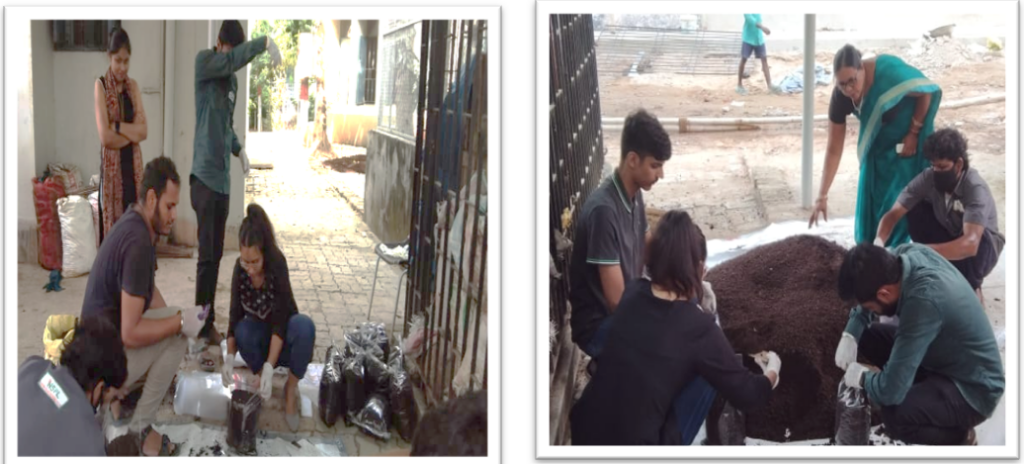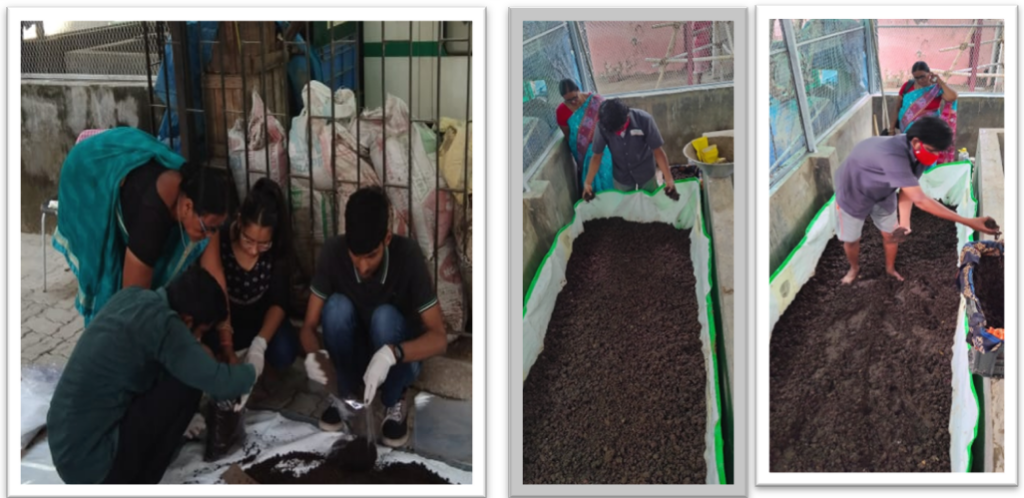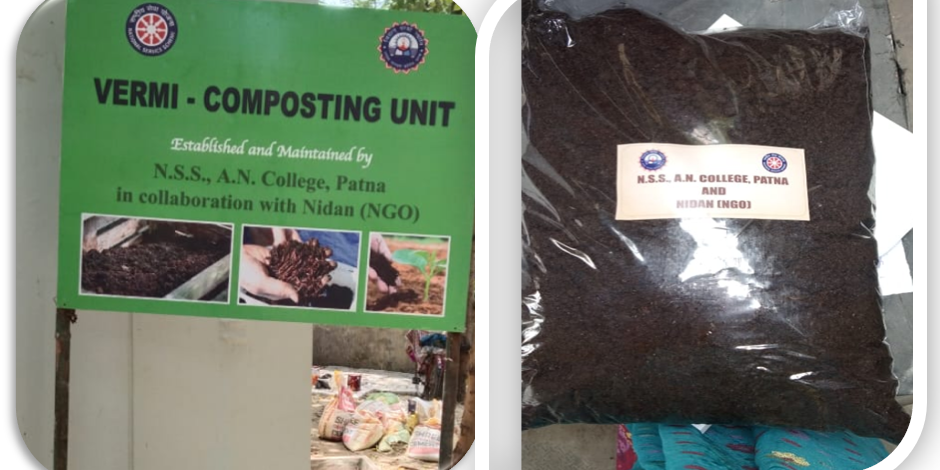An “Eco-Employment: NIDAN’s Sustainable Solution for Waste and Livelihood”
Vermi-Compost Plant by NSPL/NIDAN at AN College, Patna

Background
NIDAN NGO, in collaboration with the NSS unit of AN College, Patna, has established and is maintaining a vermi-compost plant on the college campus. This initiative is a significant step toward sustainable waste management and organic farming. The plant processes biodegradable waste into nutrient-rich vermi-compost, catering to the increasing demand for organic fertilizers among consumers and farmers. The project aligns with NIDAN’s and AN College’s mission to promote eco-friendly practices and create livelihood opportunities in Patna.
Objective
The project aims to:
- Promote sustainable waste management by effectively utilizing biodegradable waste.
- Produce high-quality organic compost for both urban and rural consumers.
- Generate income through compost sales while raising awareness about organic farming practices.
Setup and Operations
The vermi-compost plant was established on the AN College campus using eco-friendly infrastructure and locally sourced resources.
- Raw Material Collection:
- Dung Collection: AN College directly procures dung from the local Goshala.
- Biodegradable Waste: Organic waste, including vegetable peels and canteen biowaste, is collected by NIDAN from the college campus.
- Dry Leaves: Leaves from the college premises are also used as raw material in the composting process.
- Processing:
Waste is decomposed in a controlled environment using earthworms, along with materials like turmeric and neem leaves, to produce high-quality compost. - Production Timeline:
Approximately 4 quintals (400 kg) of vermi-compost are produced every 45 days, which translates to around 300–400 kg of compost per month. - Packaging and Marketing:
The compost is dried, sieved, and packed into 1 kg, 2 kg, and 5 kg bags.
It is sold by the AN College Management at Rs. 20 per kg to employees and external buyers. - Employment:
The establishment of the vermi-compost plant at AN College has played a crucial role in generating employment opportunities, particularly for individuals from the informal sector, who often face limited access to stable or formal job markets. NIDAN has created job roles for both full-time and part-time workers, which directly contributes to the local economy and empowers individuals within the community.
NIDAN’s approach to employment is rooted in its commitment to the socio-economic upliftment of marginalized groups. The organization has hired individuals from the unorganized sector, providing them with a steady source of income while offering comprehensive training and skill development. These workers have been equipped with the necessary knowledge and expertise to contribute effectively to the plant’s operations, from waste collection and processing to packaging and distribution. This empowerment through employment not only supports the financial well-being of workers but also increases their social and economic mobility.
Two individuals, Ajay Kumar and Praveen Kumar, who are local hires from the informal sector, have been trained and now work full-time at the plant. They are responsible for managing day-to-day operations, ensuring smooth processing of the compost production cycle, and overseeing waste collection and packaging. Both have expressed their satisfaction with the job, noting that it has significantly improved their livelihoods and provided them with a sense of purpose and professional development.
In addition to these full-time positions, the plant also provides part-time employment to local workers, particularly for tasks that require manual labor, such as waste collection, sorting, and assisting with compost processing. These roles offer flexible working hours, making them accessible to people who may not be able to commit to a full-time job due to other personal or professional obligations.
Furthermore, NIDAN’s collaborative approach includes involving AN College students and interns, providing them with valuable hands-on experience in sustainable waste management practices. This not only benefits the students by giving them a real-world learning opportunity but also creates a vibrant work environment where local talent and educational resources come together for mutual growth.
By prioritizing local hires, providing training, and offering ongoing employment in both full-time and part-time roles, NIDAN has successfully fostered an inclusive work environment that contributes to the welfare of the local community. This initiative stands as a testament to NIDAN’s commitment to creating sustainable livelihoods, particularly for those in the informal sector, who often face barriers to formal employment opportunities.
This elaboration emphasizes NIDAN’s commitment to training and providing sustainable livelihoods for informal sector workers while ensuring that they gain valuable skills and work experience. Let me know if you’d like further adjustments!
Impact
- Environmental Benefits:
- Processes 1.5 tons of organic waste monthly, reducing landfill contributions.
- Enhances soil fertility and reduces reliance on chemical fertilizers.
- Economic Empowerment:
- Generates a sustainable revenue stream through compost sales to urban gardeners, farmers, and nurseries.
- Consumer Reach:
- Produces 300–400 kg of compost monthly.
- The compost is purchased by AN College staff, bureaucrats, and local community members for both personal and official use.
- Awareness and Training:
- NIDAN conducts live training sessions for AN College students and interns in relevant departments.
- Workshops are held to raise awareness about sustainable waste management and the benefits of organic compost.
- Employment:
- Created employments from the unorganized sector.
Testimonial
Mr. Sinha, a local buyer and regular customer of the compost, says:
“The compost from (NIDAN) NSPL’s plant has significantly improved my Gardening and home based farm. It is affordable, organic, and delivers better results than chemical fertilizers.”
Future Plans:
- Expand operations to other educational institutions and residential areas in Patna.
- Launch targeted awareness campaigns to encourage composting at the household level.
Conclusion
NSPL’s vermi-compost plant at AN College is a benchmark for sustainable development. By utilizing biodegradable waste, the initiative not only reduces environmental degradation but also provides economic opportunities and promotes eco-friendly practices. With active participation from AN College management and local community members, this project exemplifies the potential for replication across similar institutions and urban areas.












